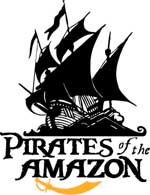Is Using the Library a Form of Piracy?
 Torrent Freak reports:
Torrent Freak reports:
Amazon, the world’s largest online retailer, is under attack by online pirates. An add-on for the Firefox browser called ‘Pirates of the Amazon’ makes it possible to shop at the Amazon store but leave without paying a dime. Instead, on Amazon product pages the add-on integrates links to ‘free’ copies on The Pirate Bay.Apparently it has since been taken down under the threat of litigation and was then played off by the creators as a university project.
‘Pirates of the Amazon’ is not the only pirate add-on for Firefox, in fact there are quite a few. IMDB, Last.fm, and Rotten Tomatoes all have their own pirate skin available. Most of them use the Greasemonkey add-on which allows the installation of all kinds of useful user scripts which customize the web to your pirate needs.
What I found ironic about this, was that I have been using a similar Greasemonkey script (written by some other low life degenerate hacker) on Amazon for years. Just like the Pirates script, I am able to access content without paying for it. Just like the Pirates script, I am depriving the authors of additional revenue. But, unlike the Pirates script, this one is completely legal as it connects to the public library. Which begs the question: should using the library be seen as a form of piracy?
Freakonomist Stephen Dubner argues that if libraries didn't already exist, they would unlikely be able to purchase books at cover price and loan them as much as they want. I think he is correct. While libraries purchase books, a strong case can be made that libraries cause fewer books in total to be purchased which is the same impact pirated goods have. One caveat to that statement is that libraries likely increase revenue for "long tail" books. Books with a niche audience are helped by the fact that each of the 120,000+ libraries wants a copy of a book that will rarely if ever get read.
The question of piracy and libraries gets even trickier with digital books. My library has digital copies of some books available for free download which can be read for 3 weeks. But, they are protected by a form of DRM which the Kindle can't read. There is a hack available to remove this DRM and allow the Kindle to access the content. Does using this hack make me a pirate?
On the one hand, legally I can't remove the DRM. On the other hand, what difference should it make if I have a Kindle or another e-book reader that is compatible with this form of DRM. My library still has the right to distribute the book digitally and I should have the right to read it.
Aside: I find it completely stupid that the library still applies physical world rules on the digital books. Each e-book can only be accessed for 3 weeks after which you can no longer open it. This is a hold over from physical books, where one person having a book restricted another from using it. But now that books are digital, in no longer applies. I can have a digital copy and another person can as well and no one is the worse off. So why restrict access for 3 weeks? Why not just limit the number of books a month a person can download and allow them to read them for as long as they want? Or limit the total number of books that a patron can have at one time? Or just allow them to download all they want and realize that individuals are limited in consumption by the amount of time they have to read? Blindly applying the physical world rules to the digital age makes no sense, and hopefully libraries will wake up to the differences.
Digital books raise the larger question of what the role of libraries should be in the digital age. Libraries allow citizens access to a large selection of books regardless of income. They also have an an environmental benefit, as many people can share the same physical copy, requiring less trees to be cut down. But, with digital books, the environmental benefit of libraries is gone.
The advantage of libraries being able to offer a large selection of books is also gone, as a Kindle can access almost any out of copyright book for free and download it in less than a minute. For books in copyright the Amazon Kindle store has a larger selection of books than most libraries offer.
Libraries also provide everyone regardless of income access to books. Of course the rich can already afford to purchase books, so this benefit is just for the poor. This raises the interesting question of whether in the digital age, governments should disband libraries and instead use that money to subsidize purchases of digital books from Amazon for low income individuals.





No comments:
Post a Comment
Note: Only a member of this blog may post a comment.